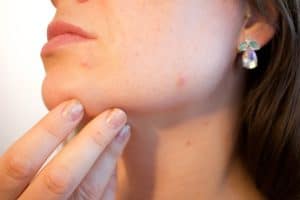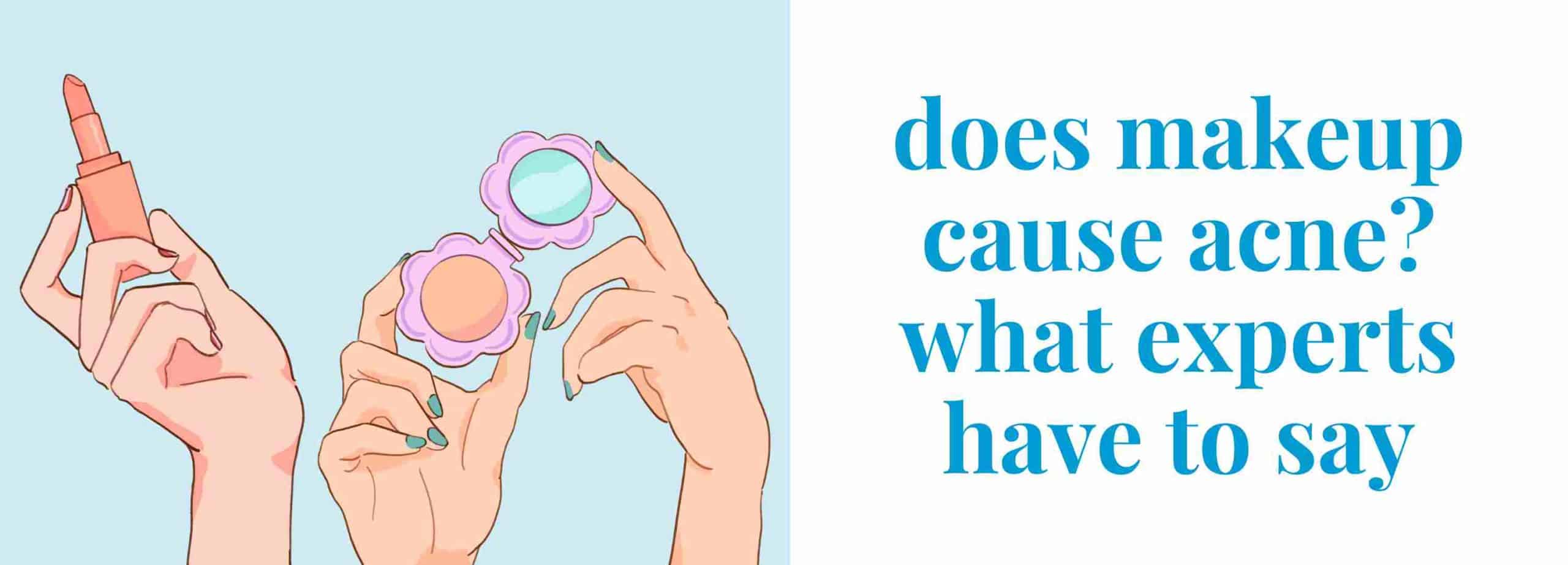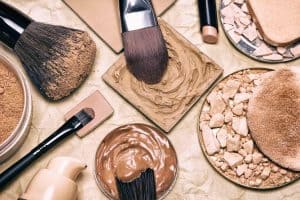Does makeup cause acne? This age-old question has left many people feeling confused about the relationship between makeup and breakouts.
So in this blog, we’ll explore the potential link between makeup and acne, including the ingredients that can contribute to acne breakouts and some tips for keeping your skin clear while still enjoying your favorite cosmetics.

Does Makeup Cause Acne?
Yes, makeup does have the potential to cause acne, particularly if you have acne-prone skin. However, if you’re using makeup with the right ingredients and taking the right precautions when applying and removing it, your skin is less likely to suffer from breakouts.
Never apply makeup or beauty products to a dirty face; dead skin cells can become trapped under the cosmetics, causing clogged pores. Clogged pores are an accumulation of skin cells, and oil that lead to pimples and breakouts. This is common among those with oily skin and anyone with acne-prone skin.
Some people may be more sensitive than others to certain cosmetics, which could also cause a breakout.
Signs Your Makeup Might be Causing Acne and Breakouts
The symptoms of makeup acne can pop up overnight, particularly after wearing makeup to bed. If you experience tiny pimples or whiteheads along the chin, cheeks, or forehead, small bumps along the lip line, or acne wherever you wear makeup (foundation, etc) you may be experiencing makeup acne.
Some other signs and symptoms of acne include pus-filled bumps or pimples and reddish, discolored bumps on the skin’s surface, called papules. Blackheads, whiteheads, and cysts can also be indicative of acne. In addition, if you experience large, deep, painful bumps under the skin, these may be nodules, another sign of an acne outbreak.
8 Ways to Prevent and Get Rid of Makeup Acne
Cosmetic acne, or acne cosmetica, is a direct result of the facial makeup and cosmetic products that you use. Heavy liquid foundations, blushes, creams, and primers have the potential to clog pores, often resulting in acne.
So, how can you get rid of makeup acne and prevent acne caused by makeup? Let’s dive in.
1. Wash your face twice a day
Start with a twice a day cleaning ritual to help protect your skin from acne. If you wear makeup products, try washing your face twice a day to ensure all these products have been removed. This is an essential step in preventing bacteria from causing pimples and breakouts from occurring. Do not wash more than twice a day because washing too often will trigger your body to make more oil.
Best Way to Prevent Acne
Don't let acne control your life. Schedule a consultation with one of our board-certified doctors today and get prescription customized acne treatment delivered straight to your door!
2. Clean your makeup brushes
How often do you clean your makeup brushes? According to experts, clean makeup brushes keep your skin healthier and may help prevent acne breakouts.
If you wear makeup daily, clean your makeup brushes thoroughly and dry them at least once a week. Also, never share brushes, because this can transmit bacteria from one user to the next.
3. Never use expired products
Avoid using expired makeup products on your face. Check your cosmetic bag, purse, and bathroom for any items past their prime. A good rule of thumb is to use a new mascara every three months, replace your other eye products every six months, and your lipsticks, foundations, and other facial products should be thrown out after a year.
4.Wash your hands before applying makeup
Putting on makeup with unwashed hands can lead to breakouts due to bacteria. Make sure you always thoroughly wash your hands before applying your makeup or completing your skincare regimen to prevent makeup acne.
5. Never go to bed with makeup on
Always remove your makeup before bed. This is critical to preventing breakouts. When cosmetics are left on overnight, you clog pores and set the stage for bumps, whiteheads, and pimples.
6. Avoid irritating ingredients in your makeup
Do you know what ingredients are in your makeup and skin products? Always read the label to discern what you are applying to your skin and whether it could be irritating. Avoid using products that contain ingredients like fragrances or essential oils – which have the potential to cause acne. Here are 12 toxic chemicals and contaminants found in makeup: formaldehyde, paraformaldehyde, methylene glycol, quaternium 15, mercury, dibutyl and diethylhexyl phthalates, isobutyl and isopropyl parabens, long-chain per- and polyfluoroalkyl substances i.e. PFAS, and m- and o-phenylenediamine that can irritate and sensitize the skin.
7. Opt for natural ingredients and non-comedogenic makeup products
Now that you are reading labels more thoroughly, look for those products that contain natural ingredients that will not cause clogged pores or breakouts. Look for beauty items and makeup products that are marked as “non-comedogenic”, which means that they ideally should not clog your pores.
8. Use prescription-grade acne treatments
Often, you may need to treat acne with a prescription medication from Pandia Health. While there are plenty of over-the-counter treatment options available, how well they work varies wildly. Prescription treatments for acne beats anything over the counter you can get for acne. Talk to our expert doctors about a prescription product for acne that is customized for your unique needs.
Enlist the Expert Doctors at Pandia Health
Pandia Health makes it easy to treat your acne! Our board-certified doctors provide tailored advice and prescriptions right from the comfort of your home. All you have to do is sign up for an account, complete an online telemedicine consultation with one of our doctors, and get your acne medication with free delivery to your door, with options for automatic refills available. Take the first step and learn more about Pandia Health’s acne treatment services, and get started with Pandia Health today.
Pandia Health is dedicated to providing accurate, reliable women’s health knowledge. Check us out on Instagram, TikTok, YouTube, and our other social channels for more information about acne treatments, women’s health, and lifestyle habits.
Disclaimer: This article is for general informational purposes and is NOT a substitute for professional medical advice. Always seek the advice of your healthcare provider before starting or changing acne treatment.


